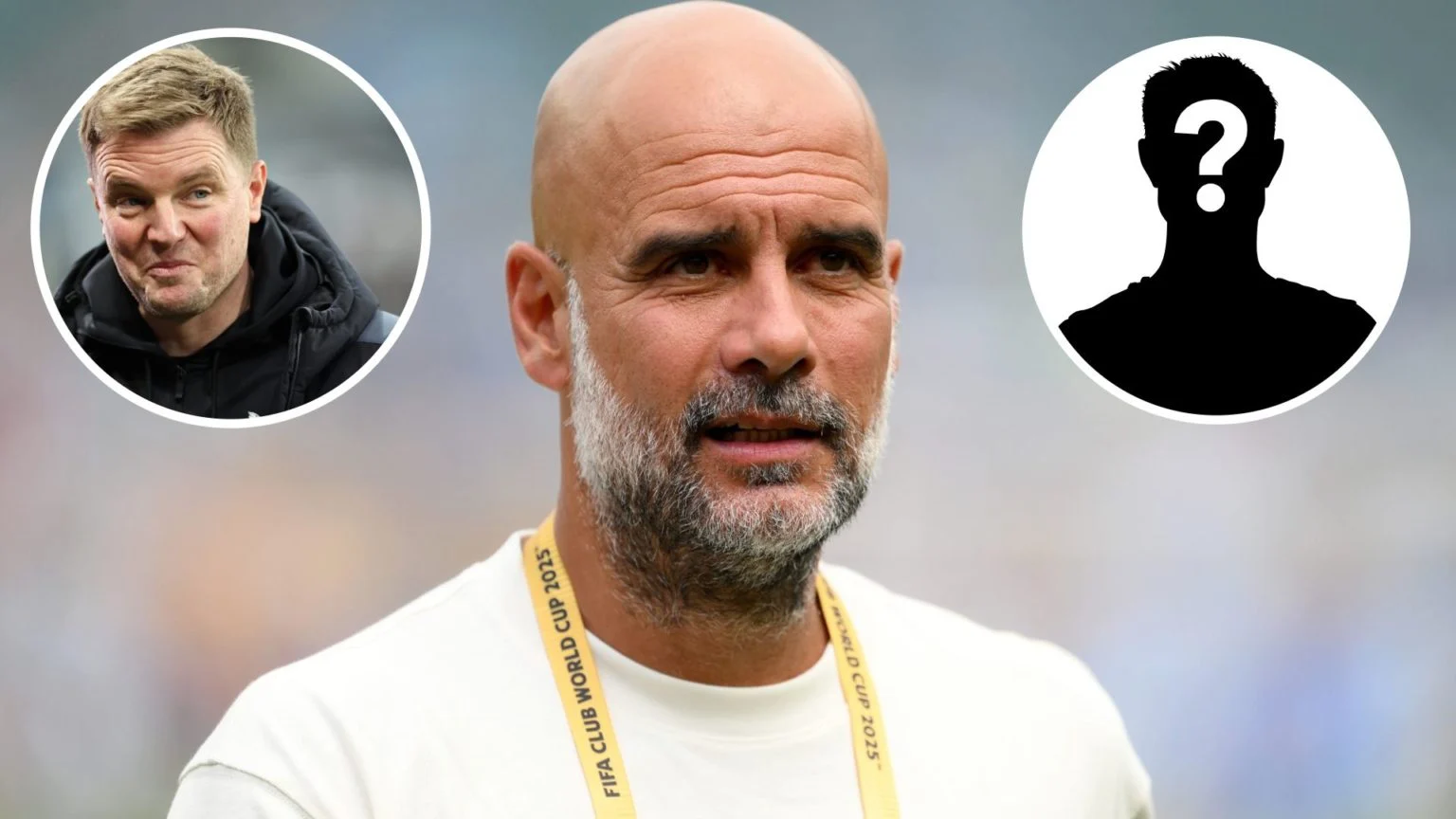Player Newcastle United sold for £23m now says he rejected a move to Man City despite them showing interest

In the ruthless world of modern football, where player loyalty is often seen as a romantic notion from bygone eras, Allan Saint-Maximin’s story stands as a remarkable testament to commitment and character. The French winger, who Newcastle United eventually sold to Al-Ahli for £23 million, has revealed that he once rejected advances from Manchester City, Arsenal, and Manchester United to remain loyal to the Magpies during their darkest hour.
The Crossroads of Loyalty and Ambition
Saint-Maximin’s revelation came during a candid interview with YouTuber Zack Nani, where the former Newcastle star opened up about one of the most challenging periods of his career. During Newcastle’s relegation battle, when the club was fighting for its Premier League survival, Saint-Maximin found himself at the center of intense transfer speculation from England’s biggest clubs.
“We were fighting relegation at the time,” Saint-Maximin recalled, his words carrying the weight of what must have been an incredibly difficult decision. “I had a lot of offers — and in terms of my career and development, leaving might’ve been the smarter choice.”
The admission reveals the internal struggle that many players face when caught between personal ambition and club loyalty. For Saint-Maximin, the choice was clear, even if it wasn’t easy. “But I didn’t want to abandon them. I stayed until the end. I stayed loyal. City, Arsenal, and United were all interested.”
Manchester City’s Transfer Philosophy Under Pep Guardiola
To understand the significance of Saint-Maximin’s rejection, it’s essential to examine Manchester City’s approach to player recruitment under Pep Guardiola. The Catalan manager and his recruitment team follow a methodical process when identifying potential signings, focusing on players who fit their distinctive style of play, address specific weaknesses in their squad, and represent value for money.
Manchester City’s transfer strategy has always been characterized by careful calculation rather than impulsive spending. They pursue players who can seamlessly integrate into Guardiola’s tactical system, which demands technical excellence, positional versatility, and an innate understanding of possession-based football. Saint-Maximin, with his exceptional dribbling ability and flair for the dramatic, represented exactly the kind of raw talent that City’s coaching staff believed they could mold into a world-class performer.
The club’s interest in Saint-Maximin wasn’t an isolated incident. Manchester City have a well-documented history of pursuing players who might not immediately fit the typical profile of a Guardiola signing but possess unique qualities that could be developed. Their approach often involves identifying players who are undervalued or playing for clubs in difficult circumstances, allowing them to secure talented individuals at relatively reasonable prices.
The Art of Player Development at Manchester City
What makes Manchester City’s interest in Saint-Maximin particularly intriguing is their track record of transforming raw talent into polished performers. Under Guardiola’s tutelage, numerous players have elevated their games to unprecedented levels. The coaching staff’s ability to refine technical skills while maintaining players’ natural instincts has been evident in the development of stars like Raheem Sterling, Riyad Mahrez, and more recently, Jeremy Doku.
Saint-Maximin’s playing style would have presented both opportunities and challenges for City’s coaching team. His explosive pace, direct running, and ability to beat multiple defenders in tight spaces are qualities that any team would covet. However, his sometimes erratic decision-making and tendency to hold onto the ball for extended periods might have required significant tactical adjustment to fit into Guardiola’s system.
The potential transformation of Saint-Maximin at Manchester City represents one of football’s great “what-ifs.” Given the club’s resources, coaching expertise, and systematic approach to player development, it’s conceivable that the Frenchman could have reached even greater heights than he achieved at Newcastle. The discipline and tactical awareness required to succeed in Guardiola’s system might have added new dimensions to his already impressive skill set.
Newcastle United’s Relegation Battle and Saint-Maximin’s Impact
During Newcastle’s relegation struggles, Saint-Maximin emerged as one of the few bright spots in an otherwise challenging period for the club. His individual brilliance often provided moments of magic that lifted both his teammates and the supporters during dark times. The winger’s ability to create something from nothing made him an invaluable asset for a team that was often starved of creative inspiration.
Saint-Maximin’s decision to remain at Newcastle during their relegation fight speaks volumes about his character and understanding of football beyond mere statistics and trophies. While joining Manchester City would have guaranteed him regular participation in European competitions, title races, and the opportunity to work with one of the world’s most renowned coaches, he chose to fight alongside his struggling teammates.
The impact of this decision extended far beyond Saint-Maximin’s personal career trajectory. His presence provided Newcastle with a psychological boost during their most vulnerable period. Players of his caliber choosing to stay rather than abandon ship sent a powerful message about the club’s potential and the loyalty that existed within the squad.
The Financial Implications of Transfer Decisions
Manchester City’s interest in Saint-Maximin also highlights the complex financial calculations that underpin modern football transfers. The club’s decision not to pursue certain targets often comes down to their assessment of value relative to potential impact. In recent years, City have shown restraint in the transfer market, walking away from deals they perceive as overpriced.
The summer’s example of Morgan Gibbs-White illustrates this approach perfectly. Despite their interest in the Nottingham Forest midfielder, Manchester City chose not to pursue a £70 million deal, deeming the price excessive for a player who hadn’t yet proven himself at the highest level. This decision-making process reflects the club’s mature approach to squad building under their current ownership.
Similarly, their decision not to compete with Arsenal for Declan Rice in 2023 demonstrated their willingness to step back from bidding wars that might compromise their financial principles. This restraint has allowed them to maintain flexibility in the transfer market while avoiding the kind of inflated spending that has troubled other clubs.
The Saudi Pro League Connection
Saint-Maximin’s eventual move to Al-Ahli for £23 million represents a significant shift in global football dynamics. The Saudi Pro League’s emergence as a major player in the transfer market has created new opportunities for players seeking lucrative contracts while still maintaining competitive football careers.
The French winger’s decision to move to Saudi Arabia rather than pursue opportunities in Europe’s top leagues reflects the changing landscape of professional football. The financial packages available in the Saudi Pro League have made it an attractive destination for players at various career stages, from established stars seeking final lucrative contracts to players in their prime looking for new challenges.
Saint-Maximin’s subsequent loan move to Fenerbahce suggests that players can use the Saudi Pro League as a stepping stone rather than a final destination. This flexibility allows players to maintain their competitive edge while benefiting from the financial rewards available in emerging football markets.
Manchester City’s Youth Development Strategy
The revelation that Manchester City are now set to sign 15-year-old Ethan Fullen from Newcastle United demonstrates the club’s long-term strategic thinking. Rather than focusing solely on established stars, City have invested heavily in youth development, recognizing that the next generation of talent often provides the best return on investment.
This approach aligns with their broader philosophy of sustainable success. By identifying and developing young talent, Manchester City can build a core of players who understand the club’s culture and playing style from an early age. This strategy has already yielded dividends with players like Phil Foden, who has become one of the Premier League’s most influential midfielders.
The signing of young players like Fullen also represents a more cost-effective approach to squad building. While established stars command premium fees, investing in youth development allows clubs to nurture talent at a fraction of the cost while maintaining control over their development trajectory.
The Evolution of Player Loyalty in Modern Football
Saint-Maximin’s story raises broader questions about the nature of loyalty in contemporary football. In an era where players regularly move between clubs for financial gain or career advancement, his decision to remain with Newcastle during their struggles represents an increasingly rare commitment to institutional loyalty.
This loyalty extends beyond mere contractual obligations. Saint-Maximin’s choice reflected a genuine emotional connection to the club and its supporters. His understanding that his presence could make a meaningful difference during Newcastle’s darkest hour speaks to a maturity that transcends typical career calculations.
The rarity of such loyalty in modern football makes Saint-Maximin’s story particularly compelling. While critics might argue that he missed an opportunity to advance his career by joining Manchester City, his decision demonstrates that success can be measured in ways beyond trophies and personal accolades.
Tactical Considerations and System Fit
From a tactical perspective, Saint-Maximin’s potential integration into Manchester City’s system would have required significant adaptation from both player and coach. His natural inclination to hold onto the ball and attempt individual brilliance would have needed to be balanced with the quick passing and movement that characterizes Guardiola’s approach.
However, City’s tactical flexibility has been evident in their ability to accommodate different playing styles within their system. The successful integration of players like Riyad Mahrez, who brought similar individual flair to the team, suggests that Saint-Maximin could have found a role that maximized his strengths while contributing to the collective effort.
The challenge would have been maintaining Saint-Maximin’s natural creativity while instilling the tactical discipline required to succeed at the highest level. This balance between individual expression and collective responsibility represents one of the most complex aspects of modern football coaching.
Looking Forward: Lessons and Legacy
Saint-Maximin’s story offers valuable lessons about the intersection of personal values and professional ambition in modern football. His decision to prioritize loyalty over career advancement challenges the conventional wisdom that players should always seek to join the biggest clubs possible.
The French winger’s experience also highlights the importance of timing in football careers. While his loyalty to Newcastle was admirable, the subsequent move to Saudi Arabia suggests that opportunities at Europe’s elite clubs may not always remain available indefinitely.
For Manchester City, Saint-Maximin’s rejection serves as a reminder that not every talented player is available at the right price or time. Their ability to identify alternative targets and maintain their high standards despite missing out on specific players demonstrates the depth of their recruitment strategy.
Conclusion
Allan Saint-Maximin’s revelation about rejecting Manchester City’s advances provides a fascinating glimpse into the complex decision-making processes that shape modern football careers. His choice to remain loyal to Newcastle United during their relegation battle represents a rare example of institutional commitment in an era dominated by financial considerations and career advancement.
While we can only speculate about what might have been had Saint-Maximin joined Manchester City, his story serves as a reminder that football success cannot be measured solely in terms of trophies and individual accolades. His loyalty to Newcastle during their darkest hour created a legacy that transcends conventional measures of achievement.
The French winger’s journey from Newcastle to Saudi Arabia and eventually to Fenerbahce demonstrates the evolving nature of football careers in the modern era. His ability to maintain his market value while honoring his commitments suggests that loyalty and ambition need not be mutually exclusive.
As Manchester City continue their pursuit of excellence through strategic recruitment and youth development, Saint-Maximin’s story will remain a fascinating footnote in their transfer history. His decision to reject their advances serves as a testament to the enduring power of loyalty in professional football, even as the sport becomes increasingly commercialized and globalized.
The intersection of personal values and professional ambition that Saint-Maximin navigated so thoughtfully offers valuable insights for current and future players facing similar crossroads in their careers. His example suggests that success in football, as in life, can be defined in multiple ways, and that the courage to follow one’s convictions often leads to the most meaningful achievements.















